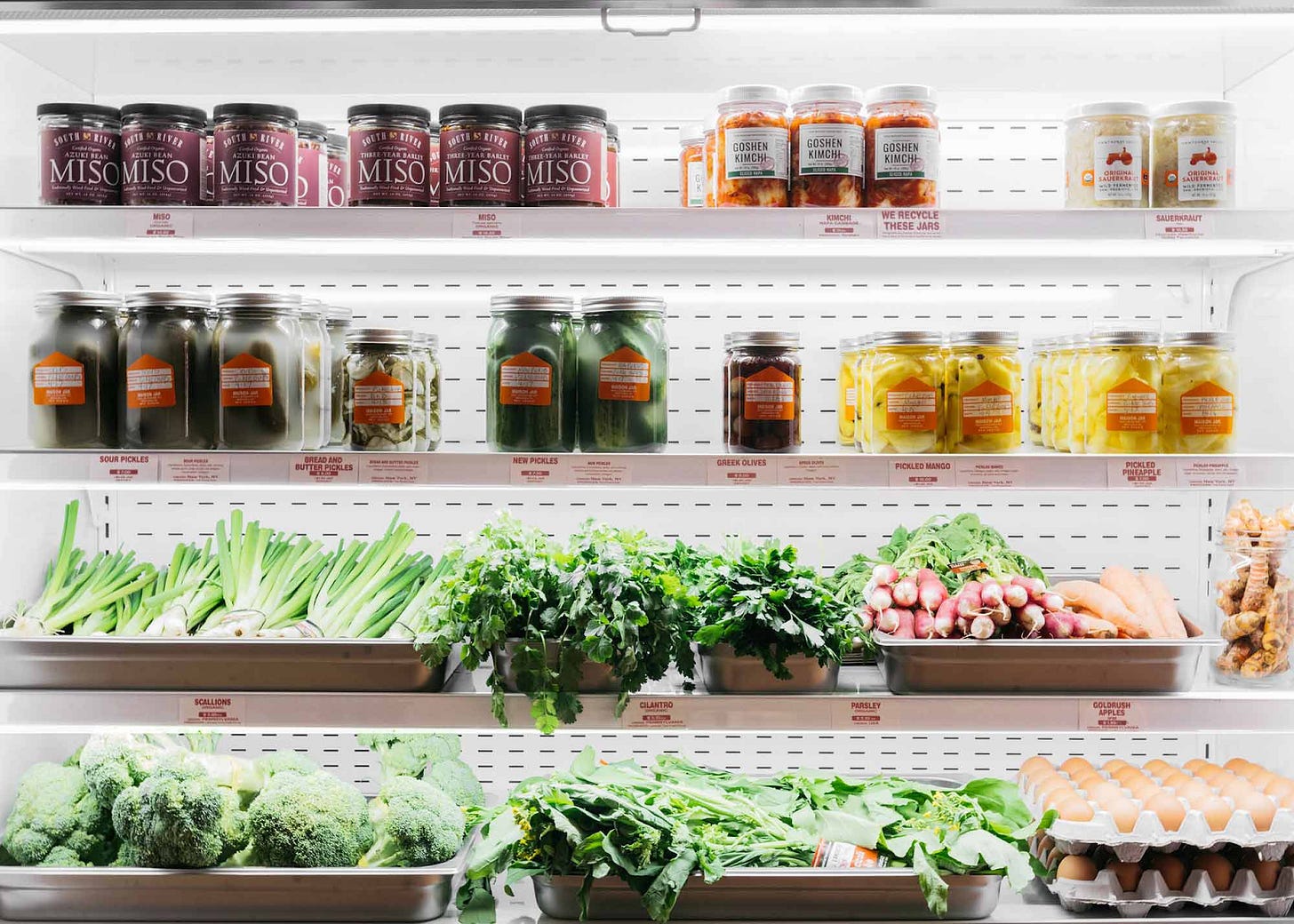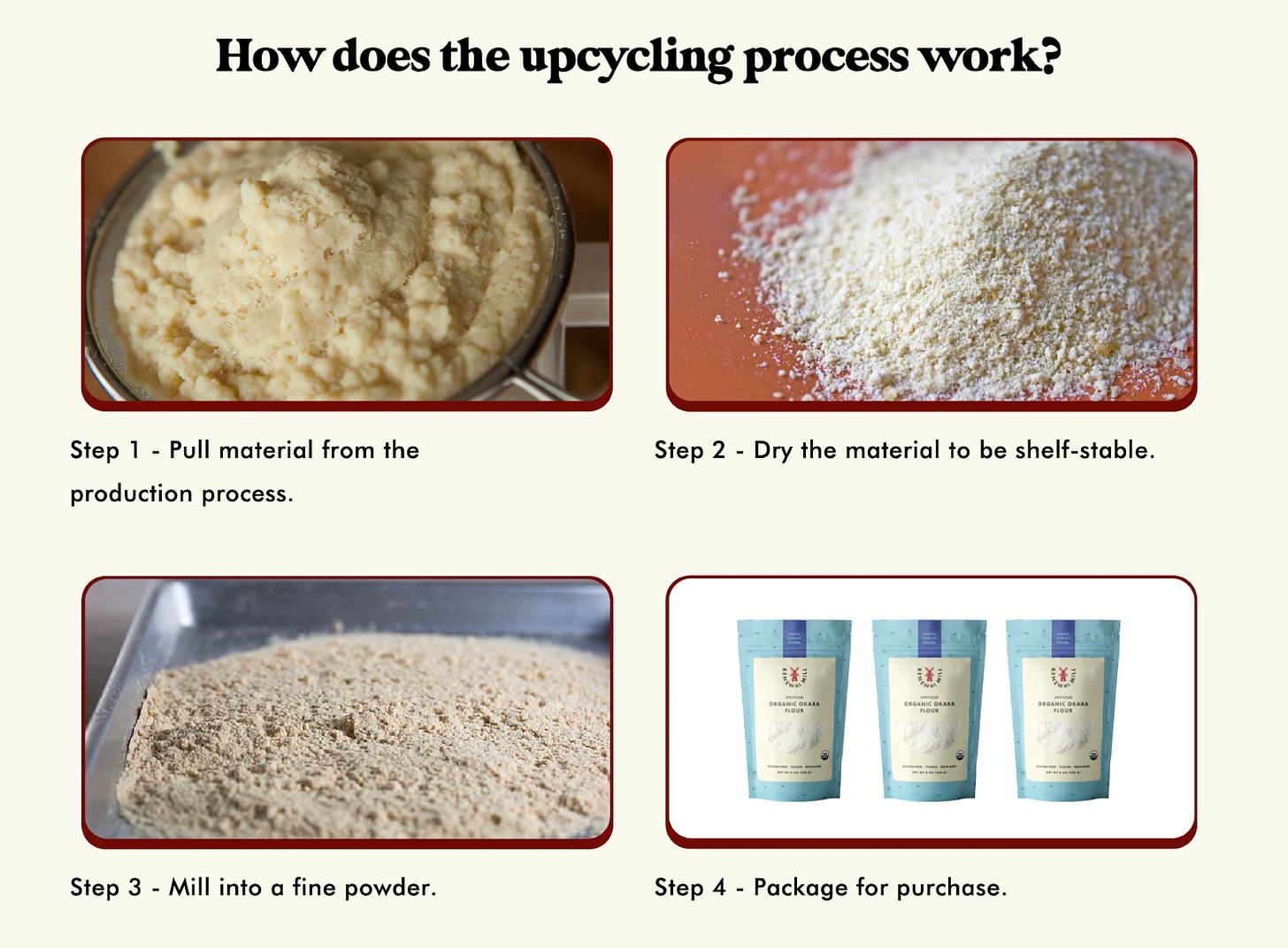🌱 Back to Basics: Food Shopping Minus the Unnecessary Waste
Featuring Maison Jar, Renewal Mill, Tomorrow Farms, Origin Coffee and more...
Happy Monday!
This week we cover:
Focusing in on: The Refill Revolution: Maison Jar Spills the Beans on the Perks of Zero-Waste Retail
Brand Spotlight: Waste Fiction: How Renewal Mill is Upcycling Soya Pulp
In case you missed it: Circularity: Buzzword or Business Model?
> Good News Last Week
🎯 Kelpi announced their new contract with Blue Skies and Waitrose to phase out plastic packaging, replacing it with seaweed-derived alternatives. This project is funded by FRESHPPACT, a UKAid supported project.
🎯 Tomorrow Farms announced that they are officially a B Corp!
🎯 Frugalpac announced that their Frugal Bottles will be launched in Aldi stores across the UK on March 18. This makes Aldi the first UK supermarket to launch own-brand paper wine bottles.
⭐️ Burger King Germany has reduced the price of their plant-based meals by 10 cents, making them cheaper than the chain’s meat-based options. This is part of their ‘plant-based for everyone’ campaign to encourage consumers to try meat-free food.
> Want good news sooner? We post every Friday on LinkedIn! If your CPG brand has good news to share, let us know.
> Focusing in on
The Refill Revolution: Maison Jar Spills the Beans on the Perks of Zero-Waste Retail
Is Your Brand Ready for Bulk?
In a corner sheltered from the hum and hustle, I’m sitting with Larasati Vitoux, owner of Maison Jar. The zero-waste Brooklyn-based shop is filled with customers earnestly trying not to spill soap or allow rogue pistachios to hit the floor as they fill their chosen receptacles while doing their weekly shopping. I swung by to pick Larasati’s brain about how brands can best partner with plastic free shops like hers across the globe — and the benefits they may reap from doing so. She, being French, leaves me with one key thought: France is dramatically ahead of many other countries when it comes to prioritizing bulk shopping and reducing plastic reliance in grocery stores.

In late 2019, a French law established that “by 2030, 20% of the floor surface of shops larger than 400 square meters must be fitted with refill systems.” This means that French shoppers can hopefully soon visit large grocery stores, armed with their own containers, and pay for pantry products based on weight. Comme c'est facile!
Why the innovation? France was lagging behind its EU counterparts on single-use packaging reduction: 187 kg of packaging was generated per person in 2019 vs the 177 kg EU average, and no substantial French progress was observed there between 2009 and 2019.
Food for Thought
Maison Jar has experienced great success in their Greenpoint, Brooklyn neighbourhood since their 2022 opening, and quickly became the “one-stop-shop” of Larasati’s dreams. Customers can drop off unwanted cords, lightbulbs, or even vapes (Gen Z, are you listening?), rent household gadgets, and do all pantry, produce, personal care, and cleaning product shopping. Thanks to their steady growth, Larasati and team are now able to set their sights on establishing closed loop systems - where bulk packaging can be reused throughout the supply chain - with as many suppliers as possible (here’s a good example from the Miniml brand).

Larasati laid out these incentives for brands to adopt a closed loop model, or at minimum facilitate bulk orders:
Shipment Savings: When Maison Jar restocks their shop, their vendors and partners usually pay for the shipping of goods. If businesses like Maison Jar can place larger-volume orders, vendors can consolidate shipping costs into one, more impactful, delivery.
Packaging Savings: This feels like an obvious one, but it merits being called out explicitly — product packaging can be expensive! If you have a better packaging system (ideally, a closed loop system) you can significantly decrease the amount you need to regularly spend on more individual packaging solutions.
Order Expansion: Larasati explained that when partners have been able to adopt a closed-loop system (like Dr. Bronner’s or Element Brooklyn), that it incentivizes her to expand their order size with that vendor.
Larasati is excited about the progress she’s seen and the collaboration from brands and vendors towards the mutual goal of packaging reduction. When it comes to closed loop, she stated “it’s not as easy, but I’m always happy to see how [ready] our vendors are to help and try to do better. The willingness is definitely there.”
Future Proofing Your Business
Brands everywhere should start preparing for what we hope will be a refill revolution, driven both by legislation and changing consumer behaviour (demonstrated by the success of independent shops like Maison Jar). Ensuring that you have an early start working through bulk, and ideally closed loop, logistics will unlock earlier cost-savings and establish you as a strong partner of large groceries and smaller zero-waste shops.
As you navigate the bulk(y) landscape, don’t be afraid to ask the experts - just like we did! Look for local refilleries via online databases (for the U.S, Litterless and in Europe, Fill) and talk directly with proprietors to learn their requirements and processes. Happy package-free planning!
> Brand Spotlight
Waste Fiction: How Renewal Mill is Upcycling Soya Pulp
Did you hop on the homemade almond milk trend when it infiltrated TikTok? If so, you’d know that producing most plant-based milk generates a ton of excess waste in the form of pulp.
Renewal Mill saw the resources wasted in soya production as a business opportunity and is reinventing one of the most essential ingredients — flour.
Founded by two women in Oakland, California, in 2016, Renewal Mill is on a mission to do their part in combating global food waste while creating products that are upcycled, chef-crafted, gluten-free, dairy-free, and nutritious.
Waste, or High-Nutrient Opportunity?
The pulp left over when soya is processed to make beverages or tofu is called okara. East and Southeast Asian cultures traditionally consume this excess, but modern products remove the okara because of its potentially off-putting taste.
Okara makes up 1/5 of the final soya product and poses a problem to producers as it’s highly perishable and time-consuming to repurpose and dispose of sustainably. Almost always, it’s treated as waste. However, this ingredient is incredibly high in fibre and protein and is naturally gluten-free.
Renewal Mill is giving this product a second chance, creating flour from it and incorporating it into baking mixes and packaged cookies it sells.

But Renewal Mill’s goal is larger than upcycling only okara. They see their process of saving, drying, and milling ‘waste’ products being applied to oat pulp, potato peels, grace pomace and more in the future. Co-founders Claire and Caroline want “to create a new circular economy of food that closes the loop in today’s current supply chains, keeps valuable nutrition from going to waste, and reduces our impact on the environment.”
Breaking Bread, Building Alliances
In 2023, Renewal Mill debuted a co-branded Upcycled Vanilla Cake & Cupcake Mix, using Perfect Day’s Egg Replacer to replicate the taste of a gooey cake. Other consumer goods companies have also used the okara to improve their own products. Pulp Pantry uses the flour to increase the fibre and upcycled food content in their grain-free chips, while Tia Lupita makes an okara-based tortilla.
Renewal Mill also works with 1% for the Planet and is Upcycled Certified, Fairtrade, and Certified Plastic Negative. Being plastic-negative means they remove double the plastic from the environment as they use in their packaging. We’d love to see them eliminate plastic from their production completely - but this is a start!
Zero Sacrifices on Taste
Renewal Mill believes their products “must be delicious enough to please as many people as possible—not just vegans and/or gluten-free folks, and not just food activists or true believers either,” while having an impact.
The brand’s efforts have:
Diverted 650,000 lbs of food waste
Avoided 960,000 lbs of CO2 emissions in 2022
Saved 44 million gallons of water by maximizing the value of soya already grown
Renewal Mill is tired of seeing valuable nutrients wasted when they could be feeding the world. What waste do you create in your kitchen that could be upcycled?
Take a closer look at Renewal Mill:
> In case you missed it
Circularity: Buzzword or Business Model?
Featuring Origin Coffee, Kaffe Bueno, First Mile and more...
Dive into the definition of, and the business case for, circularity. Learn from brands like Origin Coffee about adopting circular business models.

> Follow up with…
Podcast: Sustainable Squad: Bread, beer and bar stool activism with Toast Ale
Company: Cracking Good Food, community cooking workshops and foraging
👉 Pssst - want to be featured in our ‘Meet the Partners’ series? Reach out here!

